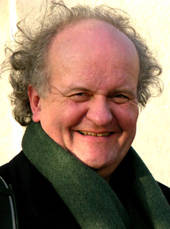

Wolfgang Rihm
Die Eroberung von Mexico
Short instrumentation: 3 4 4 1 - 3 3 3 1 - timp, perc(5), hp, pno, e.org, e.bass(2), vln(2), vla(2), vc(6), cb(4) - wind machine
Duration: 120'
Übersetzer: Brigitte Weidmann
Textvorlage: Antonin Artaud
Libretto von: Wolfgang Rihm
Choir: Bewegungschor (Spanish, Aztecs, animals and human ... doubles...), on tape: SATB (also speaking and whispering choir)
Roles:
Montezuma
dramatic soprano Cortez
baritone A screaming man Malinche
the interpreter
silent
dancing in the orchestra: 1 very high soprano
1 alto
2 speakers
Instrumentation details:
1st flute (+picc)
2nd flute (+picc)
3rd flute (+picc)
1st oboe
2nd oboe
3rd oboe
cor anglais
1st clarinet in A
2nd clarinet in A
3rd clarinet in A
bass clarinet in Bb
contrabassoon
1st horn in F
2nd horn in F
3rd horn in F
1st trumpet in C
2nd trumpet in C
3rd trumpet in C
1st trombone
2nd trombone
3rd trombone
contrabass tuba
timpani
1st percussion
2nd percussion
3rd percussion
4th percussion
5th percussion
harp
piano
electric organ
1st electric bass
2nd electric bass
1st violin
2nd violin
1st viola
2nd viola
1st violoncello
2nd violoncello
3rd violoncello
4th violoncello
5th violoncello
6th violoncello
1st contrabass
2nd contrabass
3rd contrabass
4th contrabass
choir-tape: 1st clarinet in A
2nd clarinet in A
3rd clarinet in A
4th clarinet in A
electric organ
Rihm - Die Eroberung von Mexico
Sample pages
Audio preview
Work introduction
Ismael G. Cabral interviews Wolfgang Rihm
How do you see Die Eroberung von Mexico 21 years after it was composed?
Rihm: I am always surprised when I hear earlier works again after a long time. Sometimes it seems as if something in them were waiting to be “redeemed” years later and to appear. But at other times, other characteristic attributes seem to have disappeared, sunk in a sleep. Since I do not sit beside the works to oversee them, I am surprised every time.
What did you find in the original Artaud text to become part of your work?
Rihm: Artaud’s theatrical work is not a historical drama; it is a phantasmagoria about ambivalence: hence his mantra “male-female-neuter.” We are already in the midst of a music which has always already begun.
What exact moment of your career does this composition represent?
Rihm: I am not the subject of my biography; I live this (= my) life myself. Therefore, only a biographer can really answer that question. I “engender” myself through works – but I let them go.
Why “musical theatre” and not “opera?”
Rihm: The term “musical theatre” seemed the more comprehensive of the two: theatre out of the spirit of music, music out of the spirit of the theatre. Today I’m more relaxed about it; one could also call it an opera.
Would you say that Die Eroberung von Mexico is one of your most avant-garde works?
Rihm: That should be decided by those who research my works and who believe they must operate using standardising terminology (like “avant-garde, “etc.).
What do you think of Pierre Audi’s work for this new production?
Rihm: I am grateful to Pierre Audi for two very successful productions: Jakob Lenz in London in 1980 and Dionysos in Salzburg in 2010. He is an extremely painstaking director who can keep music and scene in a state of productive uncertainty.
In terms of the vocal aspect, Die Eroberung von Mexico is not far away from Oedipus – but what are the musical differences in your latest musical theatre piece Dionysos?
Rihm: For me, there are no great differences. It is easy for me to hear the singing of the one in the singing of the other.
The work has been performed in Mexico but not in Spain. Do you think the Spanish audiences will understand the plot?
Rihm: But of course. Besides, Artaud is a kind of “classic” and his theatrical drafts are immediately recognisable as multilayered visions which “understanding” in the facile sense cannot approach.
Should Spain apologise for the conquest?
Rihm: Actually, it is not possible to “apologise” for history; at most, one can learn from it – cope with it, endure it, possibly even suffer from it. But that is my personal interpretation. I feel that demanding an apology for a historical event would be an act of posthumous hubris. What innocence, what blamelessness would that attain? – and forgiveness would not overcome anything.
Alejo Perez will conduct Die Eroberung von Mexico in Madrid and Jakob Lenz in Cologne soon after that. Are there interpreters who relate to your own aesthetic, such as Boulez and Stockhausen?
Rihm: I am very fortunate in having had great interpreters of my works at all times, whereby it was never particularly important whether the artists concerned shared my aesthetic. I do not see that as a prerequisite for a successful interpretation; specialisation is more of an obstacle to discovering the complexity of a work of art. It is of course splendid when enthusiasm, even love, join together with technical prowess.
How are the two main characters Cortez and Montezuma characterised in the opera?
Rihm: Sonic spheres: vocal characteristics. Artaud’s mantra “male-female” plays an important role. The confrontation of two problematic spheres, two “cultures,” each of which is at odds with itself, determines the sonic reality. A kind of unification of opposites develops in the circumstance of unconscious conflicts – almost like an act of love.
What do you think of the critics who say today that you are a conservative composer?
Rihm: So much and so many different things have been said – and are still being said – about me that I can perceive the attempts to come to terms with a work which refuses to be categorised. Seen that way, there is a kernel of truth in everything said. I issue no solutions as to how my work is to be understood; that seems only to increase the difficulty. I claim no motto, no mantra; everyone is dependent upon his capabilities of perception and differentiation. Perhaps the claim “conservative” is more effective than saying “old-fashioned?”
You studied with Stockhausen. What is the greatest lesson you learned from him?
Rihm: In a thoroughly authentic way, Stockhausen was not at all interested in his pupils’ works. He spoke only about himself, about his own work – but we certainly learned enough from that. He emerged only a few times from his grand self-centeredness; at one of those times, his message to me – which he thought was not teachable, i.e. “lost” – was clear: “Rihm, follow your inner voice.” He wrote that to me once, too; since then I have ever been faithful to his exhortation to obey my intuition.
Ismael G. Cabral, Opera Actual
Translation: Grant Chorley, 2013

